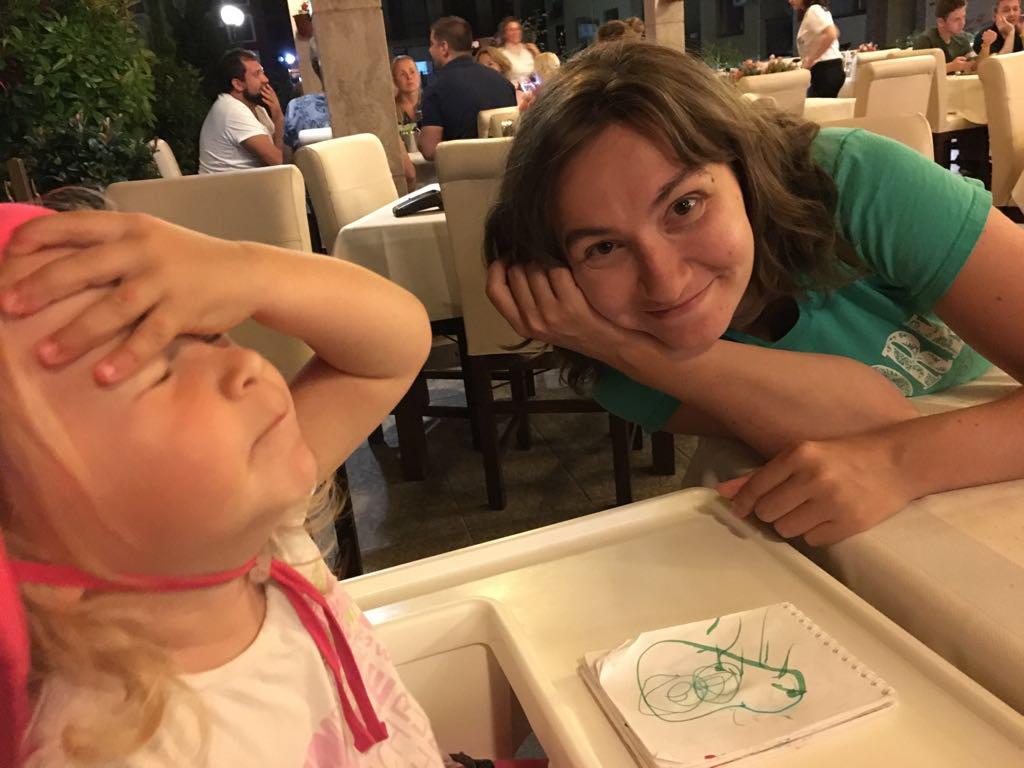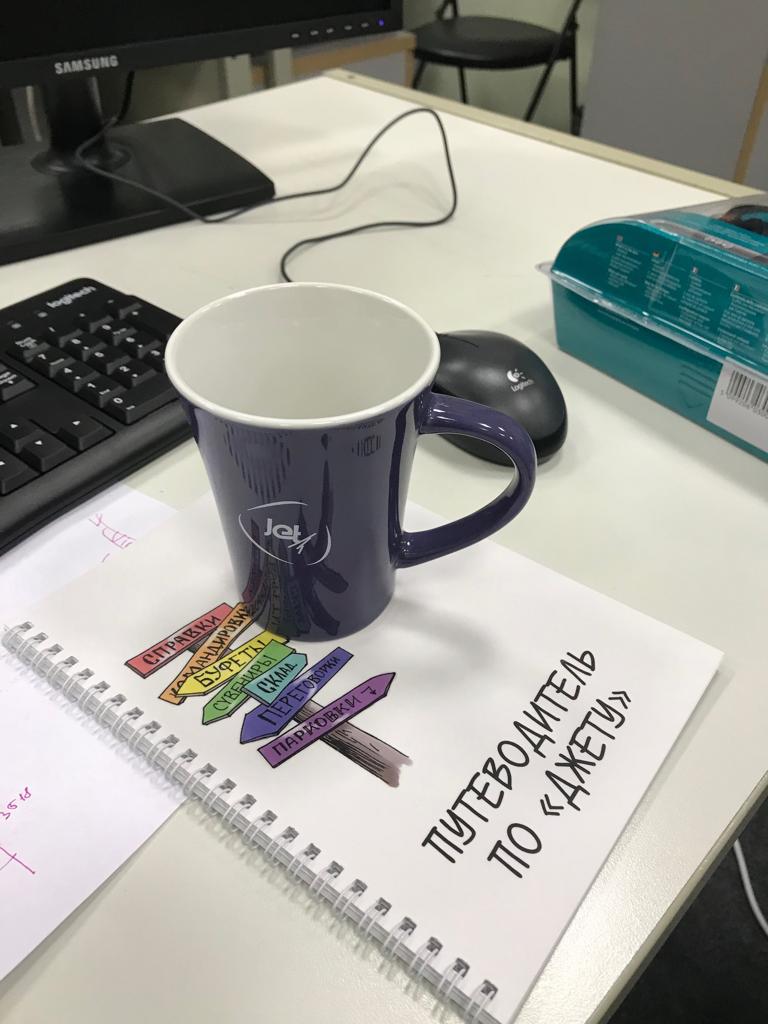Do not be afraid to try, or How I became a programmer at an age far beyond 18
When you hear the phrase “junior developer”, you probably imagine a young guy in the last years of a university or a recent graduate - but certainly not a 30-year-old woman with a young child who had taught at the university for several years and like Maya Plisetskaya from weightlifting. Only the lazy one did not ask me questions: “Why did you leave from the position of assistant professor for a junior developer?”, “How did you learn to program?”, “How did you look for work?”, “Why did you even decide to become a programmer?”, Etc. . etc.
Here I will try to answer them in this post.

The IT world is fascinatingly beautiful. Often these are good working conditions, interesting projects, the possibility of remote work, a social package, friendly offices with tennis tables, Xbox ... but to whom I tell - you already know everything :). At the moment of a sharp jump in the dollar and the euro, the Internet was just teeming with memchiki: “I am looking for a handsome programmer who receives in euros”. “Did you see the course?” Nice is not necessary! "))
')
If you have a great career that suits you - great! But if you think that it is necessary to change something decisively, and you, like me, are attracted by the development, it is very difficult to move on to those “decisive actions”. Especially when the age has long passed for 18 and you didn’t not finish the university in programming, but you hardly remember in general what year it was finished ... Something like “well, it’s very clever "," This is only for boys "," at 28-30 it is somehow too late to start programming "," this is not my fairy tale "...
Turning the next lap with a baby carriage in a small public garden near the subway and simultaneously thinking about the meaning of life, the universe and in general, I suddenly realized that I didn’t want to, I really didn’t want to go back to my work ... Not that I didn’t like working at the university - in it, as in any work, there are pros and cons. But the thought was always present that it was not mine. Yes, I liked lecturing, but not enough to earn a living. It's like a cake: it's nice to eat once a week, but it's too much for breakfast, lunch and dinner.
So what should I do? Financial Mathematics, I thought. Still, to some extent, I know mathematics - Ph.D. after all. I opened online lectures on a relevant topic: in a calm monotonous voice, the professor of each derivative gave his own name and continued to introduce more and more new terms ... somewhere on the fifteenth I realized that I was about to fall asleep and that financial mathematics, although very popular and probably an interesting topic, but nevertheless let it be dealt with by someone else.
At some point, I stumbled upon a course from the series “programming for dummies” from Duke University (in general, for such “lovers” of technical literature like me, online courses are just a find). I won’t be cunning, at the university I wondered if I’d not be engaged in development. But then all my undertakings were limited to going to the library: I took Straustrup, brought it home — and carefully put it on the shelf.
“Well, okay,” I thought now, “let's listen to this programming for dummies, at least for training English.” And here I was drawn out. With the same interest and inspiration with which my daughter is now watching "Fixico", I watched the lectures of this course. It seems to be familiar things - the same translations of color photography in black and white, auto-typing and many others - I opened with a new side, from the developer.
Then I asked for a Java OOP specialization on the Coursera as a birthday present, which surprised my loved ones a little, but as they say, the child would not be amused.
In general, if it seems to you that my decree was like dofig free time, and you are now working and you are definitely not up to mastering a new profession, then I hurry to upset you (or please). Maternity leave, although it is called a vacation, is not at all. Moreover, I do not belong to the category of superwomen, stirring the soup on the stove with one hand, the second - solving practical programming tasks, feeding the baby with the third, and wiping the “surprises” with the fourth. Of course, my relatives helped me quite a lot by doing the baby while I was dealing with Java, for which I thank them so much! But sometimes I had to finish something on the courses, when the whole family already watched at least the third dream.
In general, it was not a quick story. It took me a total of 1.5 years to beginner and intermediate courses in Java. There were weeks and months when it was not possible to listen to a single lecture. At such moments there was an extraordinary temptation to go the distance and quit everything. But whether the love of programming (and I very much hope that it was she), or the toad, strangling already paid courses, and maybe all together, brought me back to the line. Otherwise, the training itself went pretty well: I successfully coped with all the tasks and from the moment I finished my specialization right up to the first interview I thought that I knew Java quite well)).
Well, it's pretty trite here, you say: resume at hh, you respond to vacancies and go to interviews. But there are not so many initial positions, and it often happens at interviews that Java alone is not enough, you need to know at least git, maven and many more scary words)). Against the general background, a vacancy-internship from Jet Infosystems for recent graduates was very attractive, saying that if you pass the qualifying testing, we will teach you a lot. And, although my year of release did not fit the formal criteria, I nevertheless decided to send my resume, and there be that there will be.
And it was like this: first a theory test, then practical tasks If everything is successful, then invite to a 2-week intensive Java. If everything is fine after that too, you will remain in the company for an internship. The program was intense and interesting. We have learned a lot of new things about Java, and about maven and git.
The theoretical part is harmoniously intertwined with practical tasks that were tested by a whole team of developers, giving feedback, what should be improved and why. The last two days we were divided into groups, and we worked on the final project, which had to be done on time and defended, that is, we explained why this solution of the problem was chosen. I also liked that after the intensive, when I stayed for an internship, there was no feeling of “odin, absolutely odyn”, because a few more people walked along with me.

I have been working in the company for about 1.5 years and, in general, I continue to study, but already at more advanced courses. I will not discover America for you, if I say that, in general, developers have to constantly learn, but our profession is good: studying new contributes to the formation of new neural connections in the brain, which, by the way, is the prevention of many senile diseases (if the topic is about the brain and learning I'm interested in you, I recommend Barbara Oakley's courses on Coursera :))
Of course, I do not urge everyone to urgently quit their job and go to the developers. Maybe you have been a developer for a long time, and you are being pulled into management or somewhere else. Or you are a mother on maternity leave and doubt whether to return to the profession. Or did you choose a specialty according to the principle “a friend went there too” or “parents insisted”, but you are interested in something completely different ...
Try it! Maybe it will not be for you a new profession and you will understand that the former is much closer to you. But it certainly saves you from regrets about missed opportunities. Probably now one of the best times in history, when you can try and learn something new, without even leaving your home. And this is also the merit of the IT industry in which we work :)

Madina Deryagina, Junior Jet Infosystem Developer
PS: by the way, if you want to find out how you can quickly get into IT, read the interview of Alexander Sadykov about the occupation, training and growth of functional testers in our company. And I advise you to periodically check the Internship section on the Jet Infosystems website.
Here I will try to answer them in this post.

The IT world is fascinatingly beautiful. Often these are good working conditions, interesting projects, the possibility of remote work, a social package, friendly offices with tennis tables, Xbox ... but to whom I tell - you already know everything :). At the moment of a sharp jump in the dollar and the euro, the Internet was just teeming with memchiki: “I am looking for a handsome programmer who receives in euros”. “Did you see the course?” Nice is not necessary! "))
')
If you have a great career that suits you - great! But if you think that it is necessary to change something decisively, and you, like me, are attracted by the development, it is very difficult to move on to those “decisive actions”. Especially when the age has long passed for 18 and you didn’t not finish the university in programming, but you hardly remember in general what year it was finished ... Something like “well, it’s very clever "," This is only for boys "," at 28-30 it is somehow too late to start programming "," this is not my fairy tale "...
How did it all start?
Turning the next lap with a baby carriage in a small public garden near the subway and simultaneously thinking about the meaning of life, the universe and in general, I suddenly realized that I didn’t want to, I really didn’t want to go back to my work ... Not that I didn’t like working at the university - in it, as in any work, there are pros and cons. But the thought was always present that it was not mine. Yes, I liked lecturing, but not enough to earn a living. It's like a cake: it's nice to eat once a week, but it's too much for breakfast, lunch and dinner.
So what should I do? Financial Mathematics, I thought. Still, to some extent, I know mathematics - Ph.D. after all. I opened online lectures on a relevant topic: in a calm monotonous voice, the professor of each derivative gave his own name and continued to introduce more and more new terms ... somewhere on the fifteenth I realized that I was about to fall asleep and that financial mathematics, although very popular and probably an interesting topic, but nevertheless let it be dealt with by someone else.
How did you study?
At some point, I stumbled upon a course from the series “programming for dummies” from Duke University (in general, for such “lovers” of technical literature like me, online courses are just a find). I won’t be cunning, at the university I wondered if I’d not be engaged in development. But then all my undertakings were limited to going to the library: I took Straustrup, brought it home — and carefully put it on the shelf.
“Well, okay,” I thought now, “let's listen to this programming for dummies, at least for training English.” And here I was drawn out. With the same interest and inspiration with which my daughter is now watching "Fixico", I watched the lectures of this course. It seems to be familiar things - the same translations of color photography in black and white, auto-typing and many others - I opened with a new side, from the developer.
Then I asked for a Java OOP specialization on the Coursera as a birthday present, which surprised my loved ones a little, but as they say, the child would not be amused.
In general, if it seems to you that my decree was like dofig free time, and you are now working and you are definitely not up to mastering a new profession, then I hurry to upset you (or please). Maternity leave, although it is called a vacation, is not at all. Moreover, I do not belong to the category of superwomen, stirring the soup on the stove with one hand, the second - solving practical programming tasks, feeding the baby with the third, and wiping the “surprises” with the fourth. Of course, my relatives helped me quite a lot by doing the baby while I was dealing with Java, for which I thank them so much! But sometimes I had to finish something on the courses, when the whole family already watched at least the third dream.
In general, it was not a quick story. It took me a total of 1.5 years to beginner and intermediate courses in Java. There were weeks and months when it was not possible to listen to a single lecture. At such moments there was an extraordinary temptation to go the distance and quit everything. But whether the love of programming (and I very much hope that it was she), or the toad, strangling already paid courses, and maybe all together, brought me back to the line. Otherwise, the training itself went pretty well: I successfully coped with all the tasks and from the moment I finished my specialization right up to the first interview I thought that I knew Java quite well)).
How did I search and find a job?
Well, it's pretty trite here, you say: resume at hh, you respond to vacancies and go to interviews. But there are not so many initial positions, and it often happens at interviews that Java alone is not enough, you need to know at least git, maven and many more scary words)). Against the general background, a vacancy-internship from Jet Infosystems for recent graduates was very attractive, saying that if you pass the qualifying testing, we will teach you a lot. And, although my year of release did not fit the formal criteria, I nevertheless decided to send my resume, and there be that there will be.
And it was like this: first a theory test, then practical tasks If everything is successful, then invite to a 2-week intensive Java. If everything is fine after that too, you will remain in the company for an internship. The program was intense and interesting. We have learned a lot of new things about Java, and about maven and git.
The theoretical part is harmoniously intertwined with practical tasks that were tested by a whole team of developers, giving feedback, what should be improved and why. The last two days we were divided into groups, and we worked on the final project, which had to be done on time and defended, that is, we explained why this solution of the problem was chosen. I also liked that after the intensive, when I stayed for an internship, there was no feeling of “odin, absolutely odyn”, because a few more people walked along with me.

I have been working in the company for about 1.5 years and, in general, I continue to study, but already at more advanced courses. I will not discover America for you, if I say that, in general, developers have to constantly learn, but our profession is good: studying new contributes to the formation of new neural connections in the brain, which, by the way, is the prevention of many senile diseases (if the topic is about the brain and learning I'm interested in you, I recommend Barbara Oakley's courses on Coursera :))
Instead of conclusion
Of course, I do not urge everyone to urgently quit their job and go to the developers. Maybe you have been a developer for a long time, and you are being pulled into management or somewhere else. Or you are a mother on maternity leave and doubt whether to return to the profession. Or did you choose a specialty according to the principle “a friend went there too” or “parents insisted”, but you are interested in something completely different ...
Try it! Maybe it will not be for you a new profession and you will understand that the former is much closer to you. But it certainly saves you from regrets about missed opportunities. Probably now one of the best times in history, when you can try and learn something new, without even leaving your home. And this is also the merit of the IT industry in which we work :)

Madina Deryagina, Junior Jet Infosystem Developer
PS: by the way, if you want to find out how you can quickly get into IT, read the interview of Alexander Sadykov about the occupation, training and growth of functional testers in our company. And I advise you to periodically check the Internship section on the Jet Infosystems website.
Source: https://habr.com/ru/post/444776/
All Articles